How to Avoid Getting Sick When You’re Traveling
It’s always a good idea to review these important healthy tips for travelers so you can avoid getting sick when you’re on the road. You’ll see headlines these days for COVID-19, the flu, RSV, and many other illnesses worldwide. Since few vaccinations are 100% effective, it’s a good idea to take all the precautions you can when you’re traveling. Besides, who wants to be stuck in bed or worse when you’re supposed to be on an adventure?
Get Appropriate Vaccinations Before You Leave
The Centers for Disease Control and Prevention (CDC) issues recommendations and guidelines every year about flu vaccinations. Today they recommend that everyone 6 months or older receive a flu vaccine. As with all healthcare decisions, each person or their parent has a personal choice of whether to receive medical care. Flu vaccines don’t always work for every strain of flu, so it’s wise to also take other precautions to avoid the illnesses.
Talk to your doctor about what vaccinations they recommend before you travel. Depending on your age, they may suggest vaccines for flu, pneumonia, RSV, COVID, or more. If you’re traveling outside the country, there may also be other shots recommended based on your travel destinations.
Here are 11 easy healthy tips for travelers on how to avoid the flu, COVID, or other respiratory illnesses when you’re on the road.
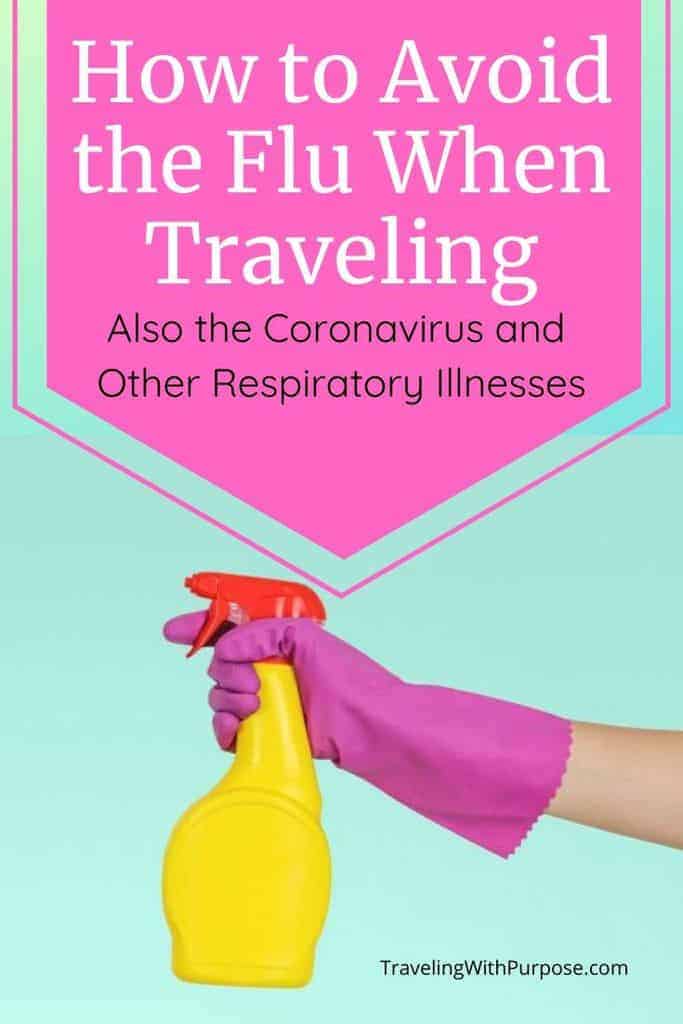
The Centers for Disease Control and Prevention (CDC) and the World Health Organization (WHO) have done extensive research on how to avoid the flu. There’s still much to learn about COVID-19 since it’s a relatively new illness on the global landscape. But, the good news is that data shows that many of the same principles apply to fight off COVID as avoiding the flu.
Here are 10 more practical tips on how to avoid the flu, coronavirus, and other respiratory illnesses. You’ll also see my picks for some ingenious products to help you stay healthy when you’re traveling.
Don’t Travel When You’re Sick
I hope it’s obvious that you shouldn’t travel when you suspect that you have any kind of illness unless there’s absolutely no way to avoid it. Justifying travel when you’re sick is inconsiderate and irresponsible to the people who you’ll be coming in contact with. Servers, flight attendants, and fellow travelers all deserve the chance to be healthy. Please don’t be selfish and go out when you shouldn’t.
Take Your Temperature if You Feel Sick
An easy way to confirm if you have an illness instead of allergies or fatigue is to take your temperature to see if you have a fever over 98 degrees Fahrenheit.
I just realized recently that the only thermometer we have is an old-fashioned glass and mercury kind that’s so hard to read. We don’t get sick very often and don’t have little ones around. It’s been years since either of us had a fever. I recently ordered this Digital Thermometer as a precaution to have on hand at home and take with me when I travel.
If you need more space in your luggage you can also try this smaller version of a digital thermometer that’s easy to carry in your toiletry bag or purse.
Don’t be selfish and think that traveling with a cough or fever is somehow ok for you or anyone around you. Be considerate, especially of those who may be more vulnerable if exposed. The health of the elderly, the very young, or those with other health issues could be complicated by an illness. It’s just common courtesy to the human race to stay home when you’re contagious.
Avoid Contact With Others When You Know You or They are Sick
Except in cases when you have to care for a sick loved one, keep a distance of 3 to 6 feet away from others when you’re sick or when you know they may be ill. This reduces the risk of transmitting a virus or disease through coughing or sneezing.
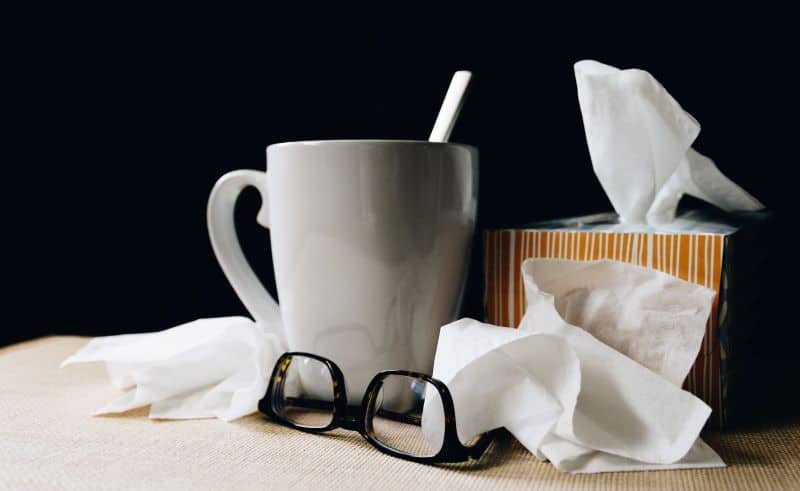
Cover Your Nose and Mouth Completely When You Cough or Sneeze
Preferably with a tissue. Then throw the tissue in the trash so others don’t have to touch it. Don’t leave a pile of germy used tissues on the table next to you. If a tissue isn’t available, sneeze or cough into your upper arm or bent elbow, NOT into your hands.
Sometimes you can be stuck somewhere when a cough or sneeze pops up. You’ll want to be sure not to infect anyone else if you’re coming down with something. 3-ply tissues, like these Kleenex Travel Size Tissue Packs, are perfect to have on hand. Carry them in your purse or car to catch that cough and protect your travel companions and other travelers.
Avoid Touching your Eyes, Nose, and Mouth
99% of the healthy tips for travelers (or anyone) are intended to keep germs off your hands. The reason for that is that inevitably your hands touch your face and transfer those germs to places that can be infected by them.
For the most part, you don’t catch an illness by just having germs on your hands. It’s the transfer of germs to your eyes, nose, and mouth that causes problems. But if you avoid touching your face it keeps you from transferring germs from your hands to your airways where it can be breathed in.
Wash your Hands Often With Soap and Water for at Least 20 Seconds

One of the most important healthy tips for travelers is to remember to wash your hands, especially after going to the bathroom; before eating, after blowing your nose, touching your face, coughing, or sneezing or touching public surfaces like stair rails, door handles, etc.
Most of us think that warm or hot water helps kill germs. Actually, unless the water is boiling (which would burn your hands) the temperature really isn’t a factor in killing off the bacteria. Warmer water does help the soap to disperse better though.
Also, studies have shown that there is no added health benefit for consumers using soaps containing antibacterial ingredients compared with using plain soap. In light of that, use whatever soap you have on hand, just make sure to use soap.
Here are further steps you can take to protect yourself and your family.
- If you use bar soap, keep it in a self-draining holder that can be cleaned thoroughly before a new bar is added.
- Don’t use a single damp cloth to wash a group of children’s hands.
- Don’t use a standing basin of water to rinse your hands.
- Don’t use a common hand towel.
- Don’t use sponges or non-disposable cleaning cloths unless you change them daily and launder them using detergent. Germs thrive on moist surfaces.
We’ve all been in that public restroom with an empty soap dispenser. A great option for making sure you have sudsy soap on hand wherever you go is to carry soap leaves, like this Rainbow Paper Soap. They’re thin slices of soap that are activated when you add a few drops of water. Kids love them too because they’re kinda magical. They also aren’t restricted by quantity when going through TSA Check-in, since they’re not liquid.
Step-by-step instructions from the CDC on proper handwashing.
Dry Your Hands Thoroughly
It’s also important to dry your hands thoroughly after washing them. Wet hands make a perfect environment for germs to thrive. Drying your hands with a paper towel or hand dryer is much better than using a reusable towel. Fabric towels could still contain dirt and bacteria after several uses.
Here’s a tip for those times when you’re out and about and there are no paper towels available. Don’t take a chance with drying your hands on your own germy clothes. I found these cool disposable “Compressed Towels” to carry everywhere. They’re individually wrapped to stay clean and dry. They start out about the size of a thick quarter. Then when you need one, simply soak it in water for 3 seconds and they expand to use as a towel or wipe.
Now, they won’t be 100% dry at first, but wring them out and they dry quickly. Even if they’re damp they still help absorb much of the extra moisture on your hands and between your fingers. Then they can be tossed away with any germs that might have been left on your hands.
Avoid Touching Public Surfaces That Carry Germs
Another helpful tip is to use a paper towel to grab the door handle when leaving a public restroom, then toss it in the trash bin. I generally recommend re-using products as much as possible to save waste. But, it’s just not practical when you’re trying to avoid the flu and other serious germs and viruses. Better safe than sorry, right?
I don’t know about you, but I also realized that in addition to any public doorknob or handle, handrails on stairs are also very germy. Instead of grabbing on to handrails, I lean on them with my forearm if I feel the need to steady myself. Then if you need to grab it, you’re right there, but in most cases, the germs end up on your sleeve instead of your hand that will eventually touch your face.
Printable Instructions for Proper Hand Washing
Print these out and teach your kids how to wash their hands. Then hang it in your family bathrooms or common areas as a reminder to everyone.
Use Hand Sanitizer When You Can’t Use Soap
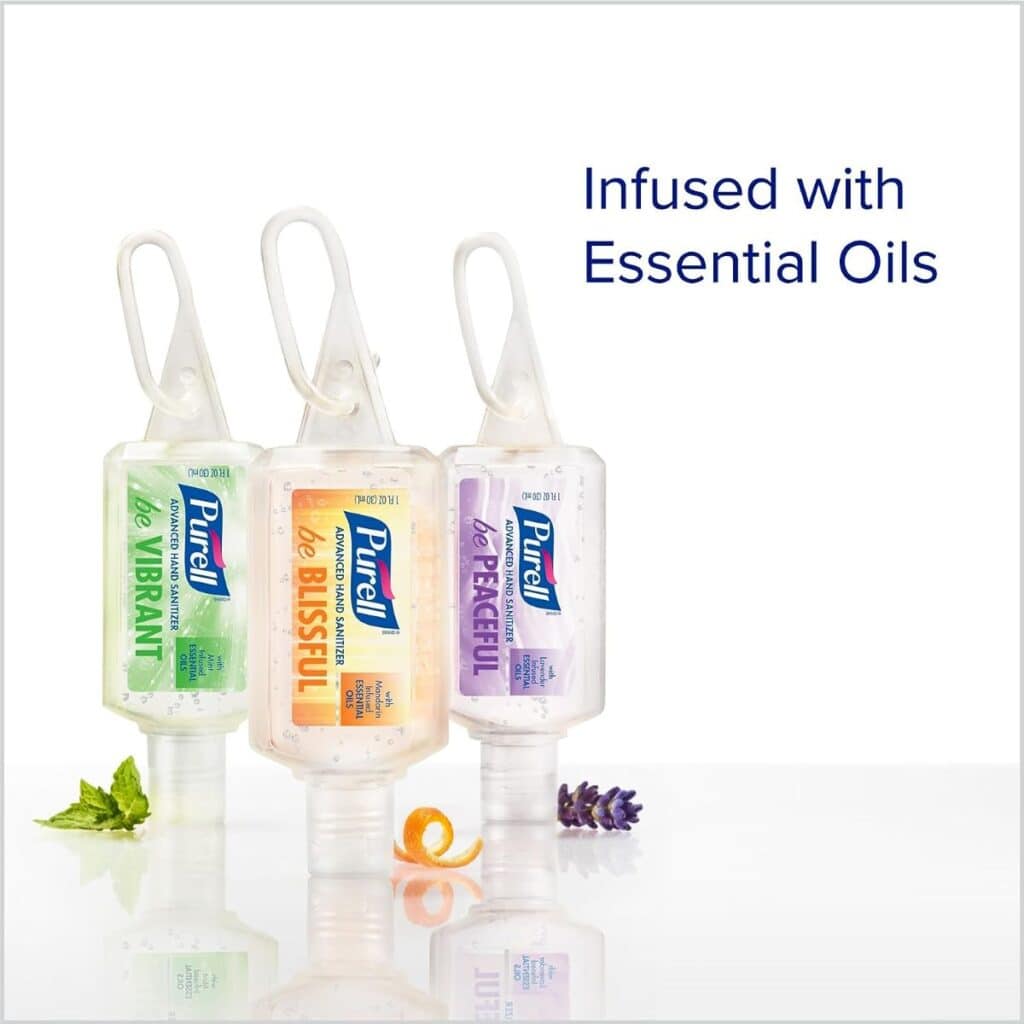
Note: Medical advice recommends that you always wash your hands with soap and water, if at all possible, when your hands are visibly dirty. If soap and water are not readily available, use an alcohol-based hand sanitizer with at least 60% alcohol until you can get somewhere to wash your hands with soap and water.
I researched hand sanitizers and found these 1-ounce Travel Sized PURELL Advanced Hand Sanitizer Gels. The carrier strap makes it easy for everyone in the family to attach them to their purse, stroller, diaper bag, backpack, travel tote, camera bag or anywhere you need them. The jelly carrier can be reused on other 1 oz Purell Bottles when the first batch is empty. These are infused with Mint, Lavender, and Mandarin Essential Oils which helps keep your hands from drying out.
Clean and Disinfect Frequently Touched Objects and Surfaces Often
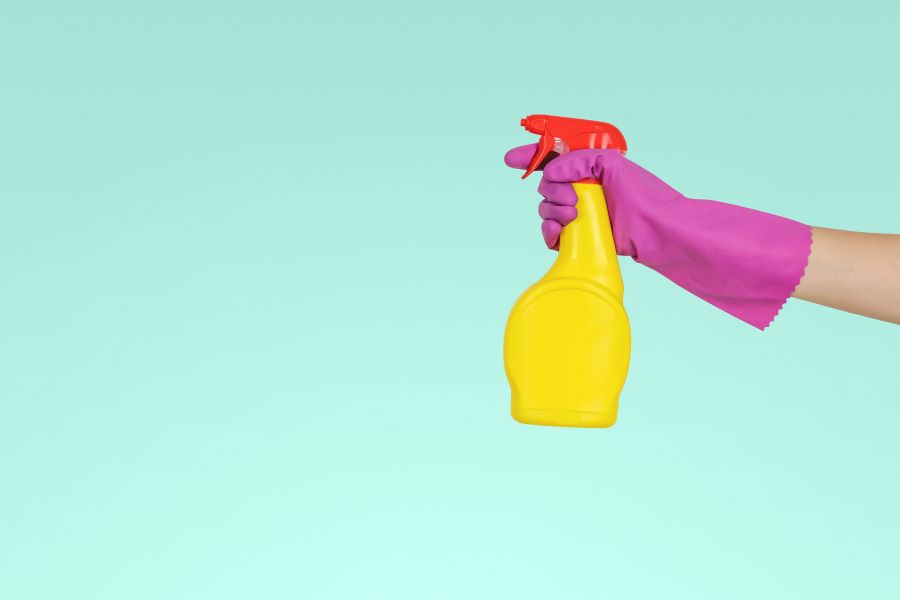
Use a disinfectant household cleaning spray or wipes to remove germs from hard surfaces like hotel door handles, bathroom fixtures, and kitchen areas.
If you have children or pets and are worried about toxic disinfectants around the house, CleanSmart Nursery and High Chair Cleaner is approved to be safe even for hospital NICUs. It’s great to carry along in the car too.
It sanitizes eating and prep surfaces on high chairs, counters, and tables and is very safe for direct food contact. Think about carrying a small bottle into your favorite restaurant to use on their high chair tray. It has zero chemical residue. It’s safe to spray directly on teethers, pacifiers, and sippy cups without rinsing. Kills germs and viruses on your stroller, changing table and diaper bin.
Or for when you’re on the road or on a flight, Sono Disinfecting Wipes are great to stash in your purse or carry-on since you don’t have to worry about them being limited by TSA.
Wear a Mask if You’re Sick
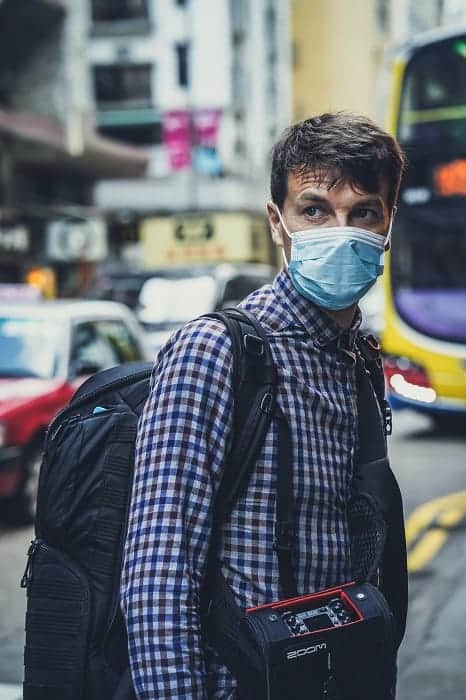
If you start experiencing any of the symptoms of flu, Covid or another illness while you’re traveling it would be wise to wear a disposable face mask. Use a new mask each time you take one off as long as you’re contagious and until you can seek medical care or confirmation of any illness. This helps prevent you from spreading the flu, COVID-19 disease or other illnesses to others.
The use of facemasks is also crucial if you’re taking care of someone who’s sick (at home or in a health care facility). You’ll need to be less than 6 feet away from them and exposed to any micro-droplets released if they cough or sneeze.
Masks are effective only when used in combination with frequent hand-cleaning with alcohol-based hand rub or soap and water.
If you wear a mask, it’s important to know how to use and dispose of it properly. If not you could expose yourself to the germs on the mask.
Watch this video from WHO showing the correct way to wear and dispose of a mask.
Do you have other healthy tips for travelers on how to avoid getting sick? I’d love to hear them. How successful are you at staying healthy when you travel?
This site contains affiliate links to products or services. Any commissions for purchases made through these links help to keep Traveling with Purpose going. and they don’t add anything to your purchase price. Thanks for your support!
Category: Travel Tips, Travel Gear, Trip Planning

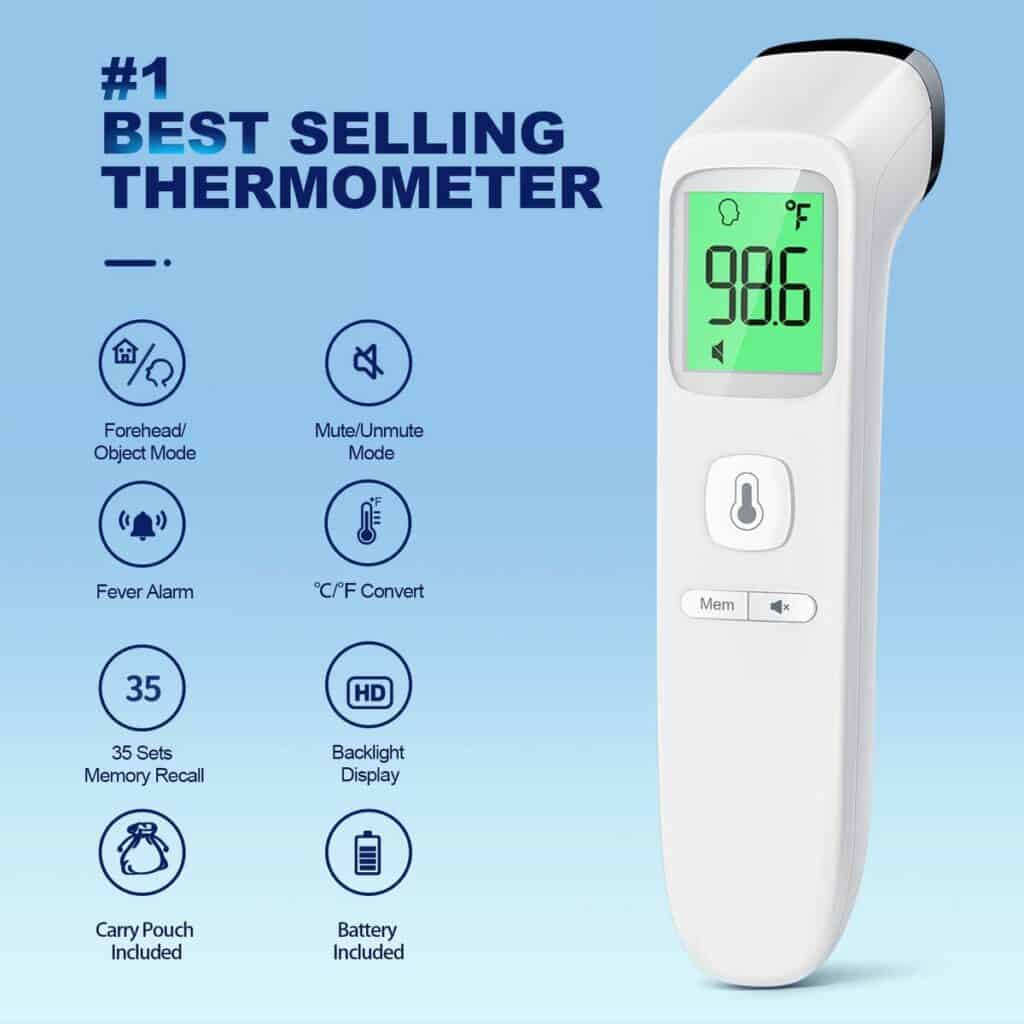
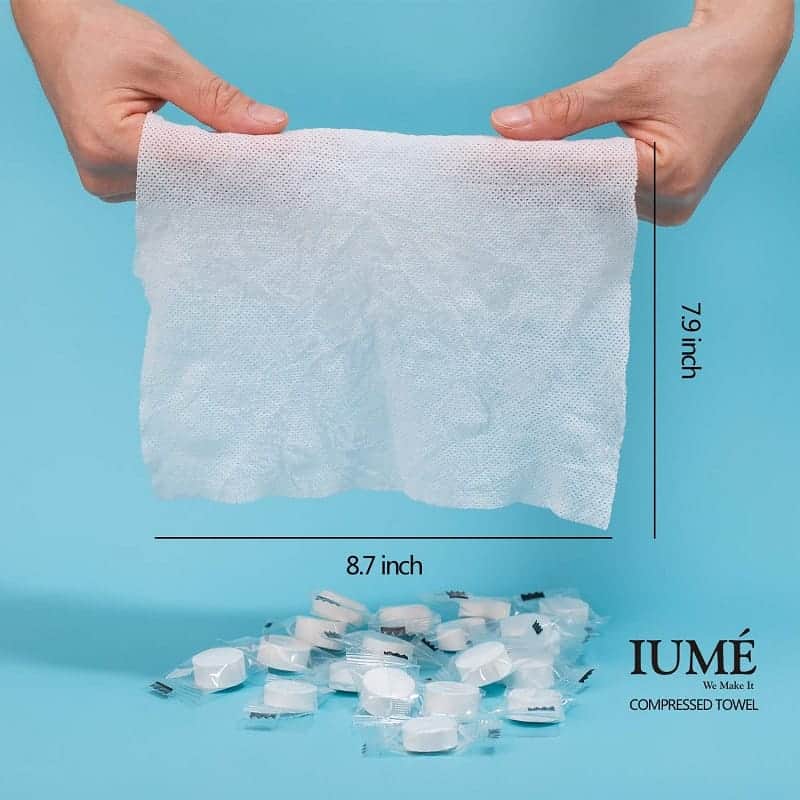
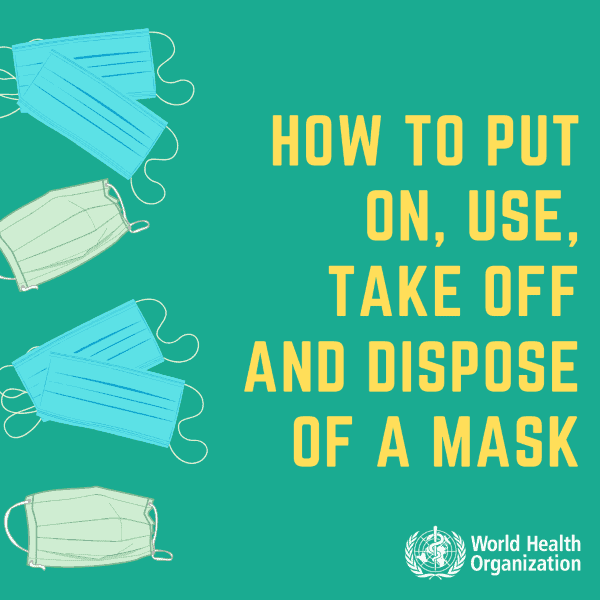








Very informative post, as washing hands and keeping our surroundings and ourselves clean is the biggest thing which all should follow. No touching of eyes, nose and mouth is another important advice. Thanks for sharing.
Hi Yukti, Touching my face is probably the hardest for me. It’s something that I rarely realize until after I’ve done it. 🙂
Thanks for the tip to have wipes on hand when you are traveling to clean door handles to hotels or in bathrooms. That way you can keep your self from germs and viruses. This is extremely useful now of days because of COVID-19, so I’ll be sure to bring some wipes when I go traveling.
Fantastic tips for staying healthy while traveling! Prevention is key, and your advice is spot on. Thanks for sharing these valuable insights!